Module 5 Lao She Teahouse 模块检测卷(含答案)
文档属性
| 名称 | Module 5 Lao She Teahouse 模块检测卷(含答案) |
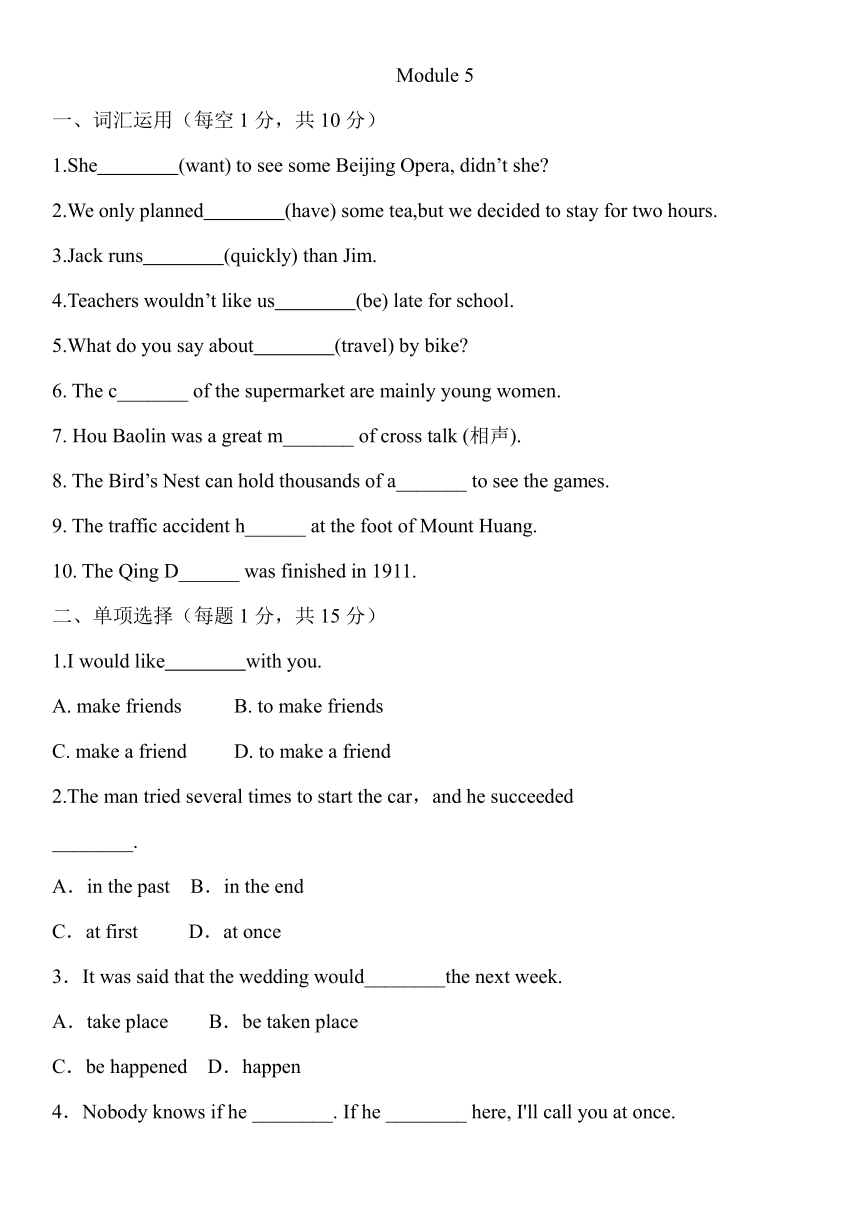
|
|
| 格式 | doc | ||
| 文件大小 | 34.0KB | ||
| 资源类型 | 教案 | ||
| 版本资源 | 外研版 | ||
| 科目 | 英语 | ||
| 更新时间 | 2020-09-19 07:46:08 | ||
图片预览

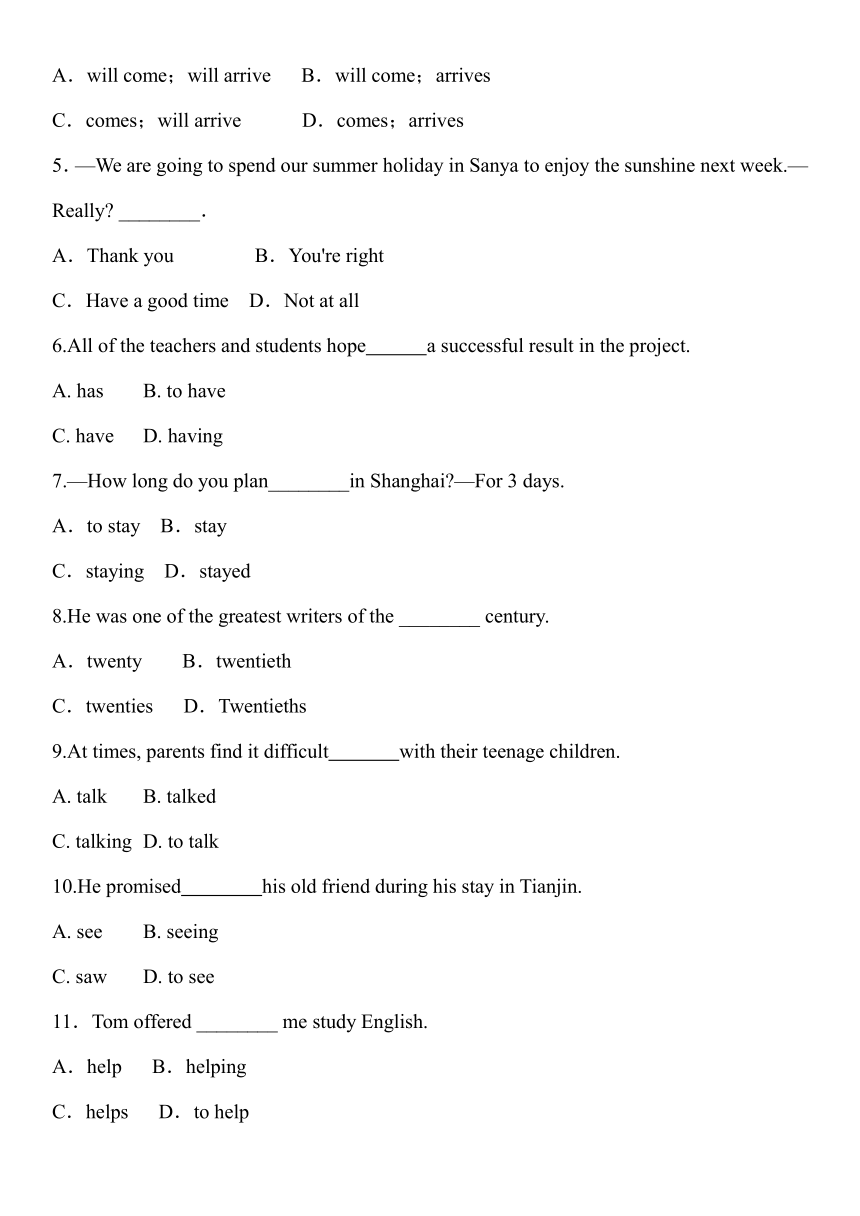
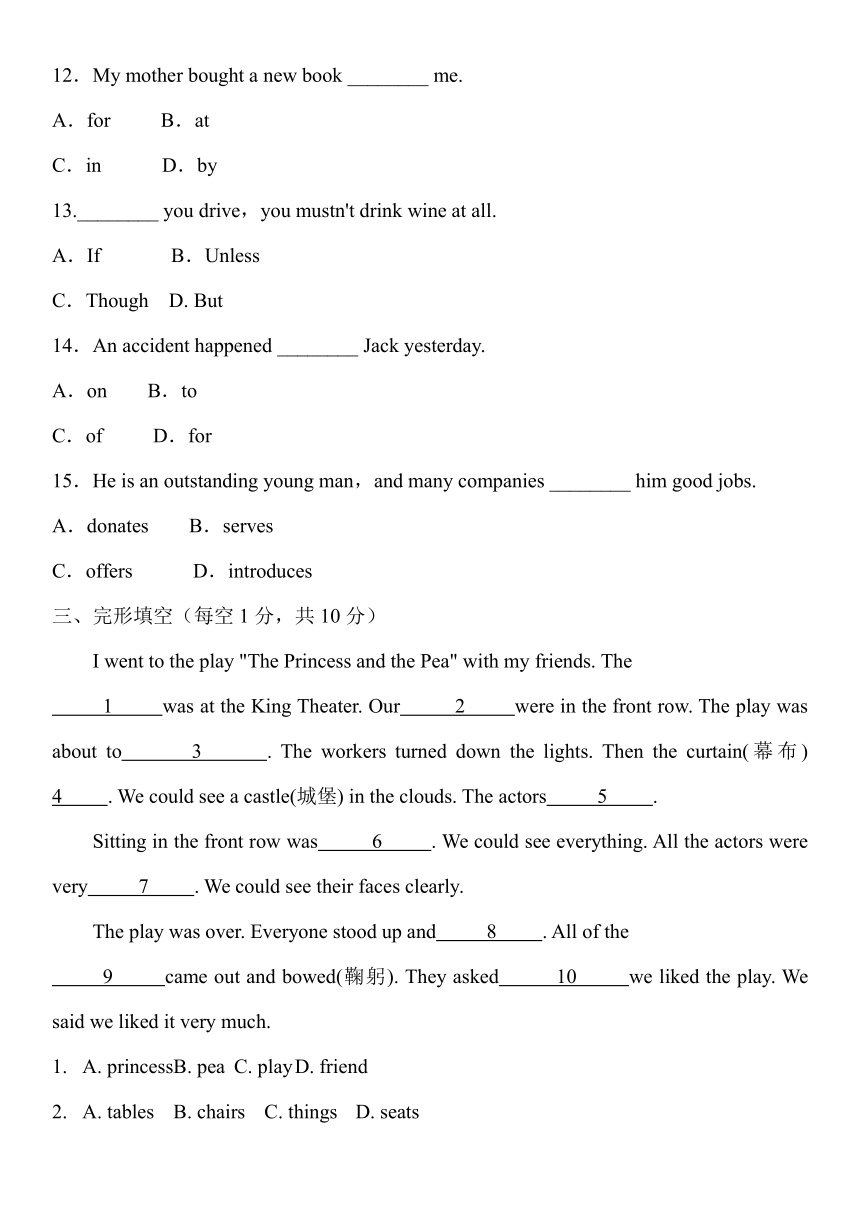
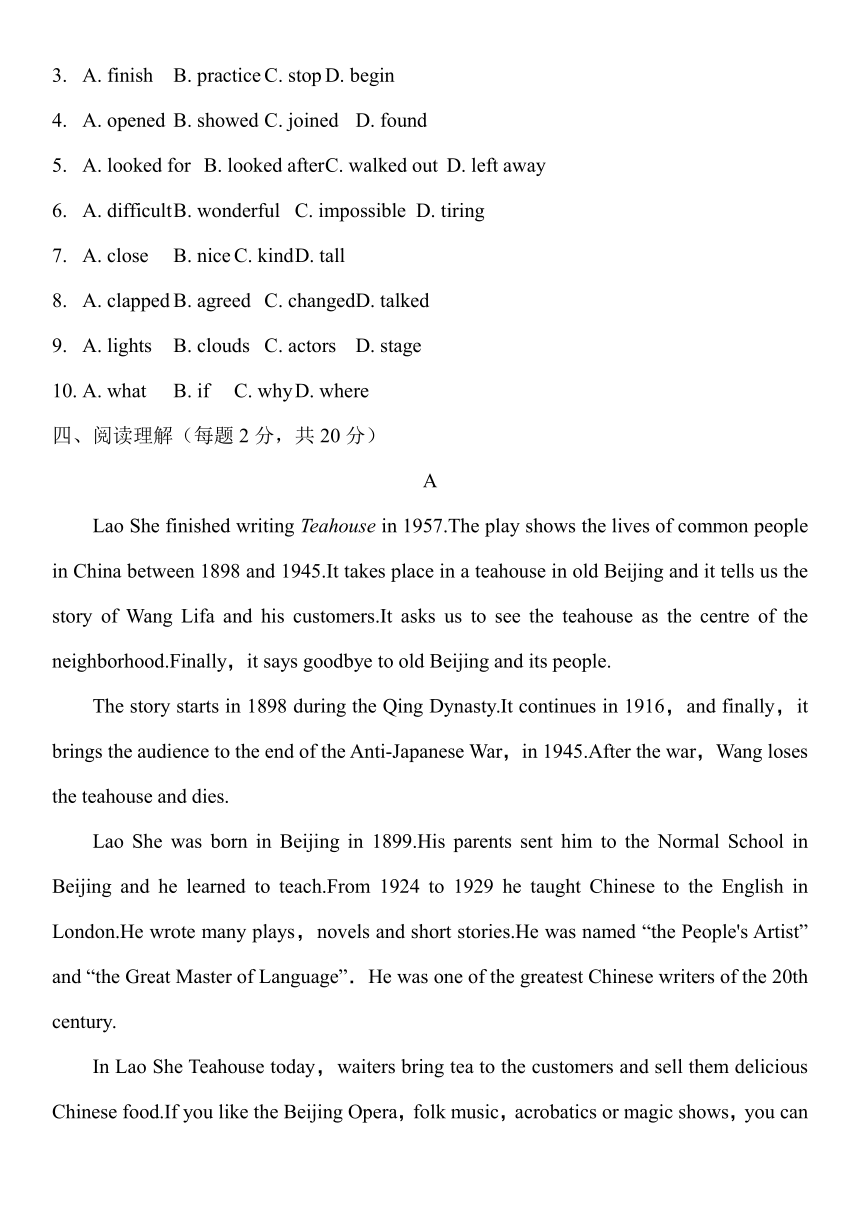
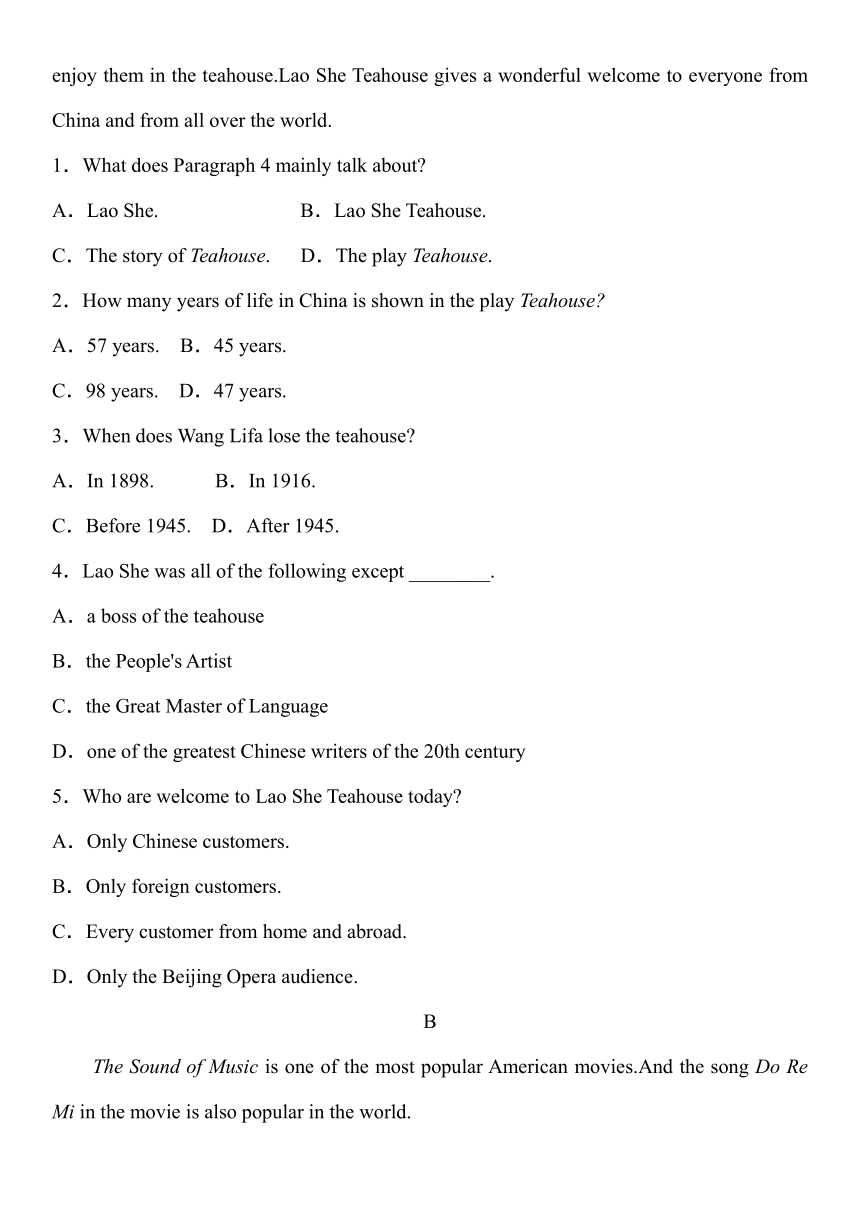
文档简介
Module 5
一、词汇运用(每空1分,共10分)
1.She (want) to see some Beijing Opera, didn’t she?
2.We only planned (have) some tea,but we decided to stay for two hours.
3.Jack runs (quickly) than Jim.
4.Teachers wouldn’t like us (be) late for school.
5.What do you say about (travel) by bike?
6. The c_______ of the supermarket are mainly young women.
7. Hou Baolin was a great m_______ of cross talk (相声).
8. The Bird’s Nest can hold thousands of a_______ to see the games.
9. The traffic accident h______ at the foot of Mount Huang.
10. The Qing D______ was finished in 1911.
二、单项选择(每题1分,共15分)
1.I would like with you.
A. make friends B. to make friends
C. make a friend D. to make a friend
2.The man tried several times to start the car,and he succeeded
________.
A.in the past B.in the end
C.at first D.at once
3.It was said that the wedding would________the next week.
A.take place B.be taken place
C.be happened D.happen
4.Nobody knows if he ________. If he ________ here, I'll call you at once.
A.will come;will arrive B.will come;arrives
C.comes;will arrive D.comes;arrives
5.—We are going to spend our summer holiday in Sanya to enjoy the sunshine next week.— Really? ________.
A.Thank you B.You're right
C.Have a good time D.Not at all
6.All of the teachers and students hope a successful result in the project.
A. has B. to have
C. have D. having
7.—How long do you plan________in Shanghai?—For 3 days.
A.to stay B.stay
C.staying D.stayed
8.He was one of the greatest writers of the ________ century.
A.twenty B.twentieth
C.twenties D.Twentieths
9.At times, parents find it difficult with their teenage children.
A. talk B. talked
C. talking D. to talk
10.He promised his old friend during his stay in Tianjin.
A. see B. seeing
C. saw D. to see
11.Tom offered ________ me study English.
A.help B.helping
C.helps D.to help
12.My mother bought a new book ________ me.
A.for B.at
C.in D.by
13.________ you drive,you mustn't drink wine at all.
A.If B.Unless
C.Though D. But
14.An accident happened ________ Jack yesterday.
A.on B.to
C.of D.for
15.He is an outstanding young man,and many companies ________ him good jobs.
A.donates B.serves
C.offers D.introduces
三、完形填空(每空1分,共10分)
I went to the play "The Princess and the Pea" with my friends. The
1 ? was at the King Theater. Our 2 ? were in the front row. The play was about to 3 ? . The workers turned down the lights. Then the curtain(幕布) 4 ? . We could see a castle(城堡) in the clouds. The actors 5 ? .
Sitting in the front row was 6 ? . We could see everything. All the actors were very 7 ? . We could see their faces clearly.
The play was over. Everyone stood up and 8 ? . All of the
9 ? came out and bowed(鞠躬). They asked 10 ? we liked the play. We said we liked it very much.
1. A. princess B. pea C. play D. friend
2. A. tables B. chairs C. things D. seats
3. A. finish B. practice C. stop D. begin
4. A. opened B. showed C. joined D. found
5. A. looked for B. looked after C. walked out D. left away
6. A. difficult B. wonderful C. impossible D. tiring
7. A. close B. nice C. kind D. tall
8. A. clapped B. agreed C. changed D. talked
9. A. lights B. clouds C. actors D. stage
10. A. what B. if C. why D. where
四、阅读理解(每题2分,共20分)
A
Lao She finished writing Teahouse in 1957.The play shows the lives of common people in China between 1898 and 1945.It takes place in a teahouse in old Beijing and it tells us the story of Wang Lifa and his customers.It asks us to see the teahouse as the centre of the neighborhood.Finally,it says goodbye to old Beijing and its people.
The story starts in 1898 during the Qing Dynasty.It continues in 1916,and finally,it brings the audience to the end of the Anti?Japanese War,in 1945.After the war,Wang loses the teahouse and dies.
Lao She was born in Beijing in 1899.His parents sent him to the Normal School in Beijing and he learned to teach.From 1924 to 1929 he taught Chinese to the English in London.He wrote many plays,novels and short stories.He was named “the People's Artist” and “the Great Master of Language”.He was one of the greatest Chinese writers of the 20th century.
In Lao She Teahouse today,waiters bring tea to the customers and sell them delicious Chinese food.If you like the Beijing Opera,folk music,acrobatics or magic shows,you can enjoy them in the teahouse.Lao She Teahouse gives a wonderful welcome to everyone from China and from all over the world.
1.What does Paragraph 4 mainly talk about?
A.Lao She. B.Lao She Teahouse.
C.The story of Teahouse. D.The play Teahouse.
2.How many years of life in China is shown in the play Teahouse?
A.57 years. B.45 years.
C.98 years. D.47 years.
3.When does Wang Lifa lose the teahouse?
A.In 1898. B.In 1916.
C.Before 1945. D.After 1945.
4.Lao She was all of the following except ________.
A.a boss of the teahouse
B.the People's Artist
C.the Great Master of Language
D.one of the greatest Chinese writers of the 20th century
5.Who are welcome to Lao She Teahouse today?
A.Only Chinese customers.
B.Only foreign customers.
C.Every customer from home and abroad.
D.Only the Beijing Opera audience.
B
The Sound of Music is one of the most popular American movies.And the song Do Re Mi in the movie is also popular in the world.
The movie tells a story about a tutor,Maria.She is a young and outgoing woman.She goes to look after a family with seven children.Their family name is Von Trapp.Mr Von Trapp is a captain.He and his family live in Austria.
The family are very sad after the children's mother,Mrs Von Trapp,died.Nobody takes care of the children.They cry and shout every day.The lonely father often becomes angry because of the noisy children.
Maria often teaches them to sing lively songs and perform short,funny plays.At first the father is almost mad,but the children's smiling faces make him happy again.Then Mr Von Trapp falls in love with Maria.At last they get married.
6.Do Re Mi is ________.
A.a movie B.a song C.a film D.a play
7.Mr Von Trapp and his family live in ________.
A.the USA B.Australia C.Austria D.England
8.The children cry and shout every day because ________.
A.Mr Von Trapp feels lonely
B.Maria comes to their home and the children don't like her
C.Mrs Von Trapp often becomes angry
D.Mrs Von Trapp died and no one cares for them
9.How does Maria cheer the children up?
A.She buys many good things for them.
B.She teaches them to write and read.
C.She looks after Mr Von Trapp so carefully that they get married.
D.She teaches them to sing lively songs and perform funny plays.
10.The story ends with ________.
A.happiness B.illness C.sadness D.anger
五、根据汉语提示补全句子(每题2分,共10分)
1.The story ________ ________(发生)in old Beijing.
2.Don't mind ________ ________ ________(提供你的帮助)to others when necessary.
3.Beijing _______ _______ _______(以……著名)many places of interest in the world.
4.I have ________ ________(不知道) who he is.
5.We ________ ________ ________ ________ ________(热烈欢迎他们)at the party.
六、书面表达(15分)
Tony作为中外文化交流的使者,从加拿大来到北京参加了近一个月的“体验中国”活动。现在,他想写封信将这里的学习和生活情况告诉远方的父母。请你根据以下提示,帮助Tony完成这封信。
提示:
(1)与中国学生相互学习;周末参加体育活动;
(2)游览北京的名胜古迹;观看京剧(the Beijing Opera);品尝美食;了解中国历史;
(3)喜欢这里的生活。
要求:
(1)语言规范,字迹工整;
(2)词数:60~80;
(3)开头和结尾部分已给出,不计入总词数。
Dear Dad and Mum,
How's it going?I hope you are in good health.I
_______________________________________________________
_______________________________________________________
_______________________________________________________
_______________________________________________________
_______________________________________________________
_______________________________________________________
Yours,
Tony
参考答案
一、词汇
1.wanted 2.to have 3. more quickly 4. to be 5.traveling
6.customers 7.master 8.audience 9.happened 10.Dynasty
二、单选
1- 5 BBABC 6-10BABDD 11-15 DAABC
三、完型
1-5CDDAC 6-10BAACB
四、阅读
1-5BDDAC 6-10BCDDA
五、补全句子
1.took place
2.offering your help
3.is famous for
4.no idea
5.gave them a warm welcome
六、书面表达
Dear Dad and Mum,
How's it going?I hope you are in good health②.I have been in Beijing for about one month.I work and study with Chinese students.At weekends,I play different kinds of① sports. Last week,I visited some places of interest② in Beijing. They are really great. I saw the Beijing Opera yesterday,and I was interested in① it. I ate the delicious food here.Now I have known more about① Chinese history. I enjoy living② here very much. I hope to see you① soon.
Yours,
Tony
一、词汇运用(每空1分,共10分)
1.She (want) to see some Beijing Opera, didn’t she?
2.We only planned (have) some tea,but we decided to stay for two hours.
3.Jack runs (quickly) than Jim.
4.Teachers wouldn’t like us (be) late for school.
5.What do you say about (travel) by bike?
6. The c_______ of the supermarket are mainly young women.
7. Hou Baolin was a great m_______ of cross talk (相声).
8. The Bird’s Nest can hold thousands of a_______ to see the games.
9. The traffic accident h______ at the foot of Mount Huang.
10. The Qing D______ was finished in 1911.
二、单项选择(每题1分,共15分)
1.I would like with you.
A. make friends B. to make friends
C. make a friend D. to make a friend
2.The man tried several times to start the car,and he succeeded
________.
A.in the past B.in the end
C.at first D.at once
3.It was said that the wedding would________the next week.
A.take place B.be taken place
C.be happened D.happen
4.Nobody knows if he ________. If he ________ here, I'll call you at once.
A.will come;will arrive B.will come;arrives
C.comes;will arrive D.comes;arrives
5.—We are going to spend our summer holiday in Sanya to enjoy the sunshine next week.— Really? ________.
A.Thank you B.You're right
C.Have a good time D.Not at all
6.All of the teachers and students hope a successful result in the project.
A. has B. to have
C. have D. having
7.—How long do you plan________in Shanghai?—For 3 days.
A.to stay B.stay
C.staying D.stayed
8.He was one of the greatest writers of the ________ century.
A.twenty B.twentieth
C.twenties D.Twentieths
9.At times, parents find it difficult with their teenage children.
A. talk B. talked
C. talking D. to talk
10.He promised his old friend during his stay in Tianjin.
A. see B. seeing
C. saw D. to see
11.Tom offered ________ me study English.
A.help B.helping
C.helps D.to help
12.My mother bought a new book ________ me.
A.for B.at
C.in D.by
13.________ you drive,you mustn't drink wine at all.
A.If B.Unless
C.Though D. But
14.An accident happened ________ Jack yesterday.
A.on B.to
C.of D.for
15.He is an outstanding young man,and many companies ________ him good jobs.
A.donates B.serves
C.offers D.introduces
三、完形填空(每空1分,共10分)
I went to the play "The Princess and the Pea" with my friends. The
1 ? was at the King Theater. Our 2 ? were in the front row. The play was about to 3 ? . The workers turned down the lights. Then the curtain(幕布) 4 ? . We could see a castle(城堡) in the clouds. The actors 5 ? .
Sitting in the front row was 6 ? . We could see everything. All the actors were very 7 ? . We could see their faces clearly.
The play was over. Everyone stood up and 8 ? . All of the
9 ? came out and bowed(鞠躬). They asked 10 ? we liked the play. We said we liked it very much.
1. A. princess B. pea C. play D. friend
2. A. tables B. chairs C. things D. seats
3. A. finish B. practice C. stop D. begin
4. A. opened B. showed C. joined D. found
5. A. looked for B. looked after C. walked out D. left away
6. A. difficult B. wonderful C. impossible D. tiring
7. A. close B. nice C. kind D. tall
8. A. clapped B. agreed C. changed D. talked
9. A. lights B. clouds C. actors D. stage
10. A. what B. if C. why D. where
四、阅读理解(每题2分,共20分)
A
Lao She finished writing Teahouse in 1957.The play shows the lives of common people in China between 1898 and 1945.It takes place in a teahouse in old Beijing and it tells us the story of Wang Lifa and his customers.It asks us to see the teahouse as the centre of the neighborhood.Finally,it says goodbye to old Beijing and its people.
The story starts in 1898 during the Qing Dynasty.It continues in 1916,and finally,it brings the audience to the end of the Anti?Japanese War,in 1945.After the war,Wang loses the teahouse and dies.
Lao She was born in Beijing in 1899.His parents sent him to the Normal School in Beijing and he learned to teach.From 1924 to 1929 he taught Chinese to the English in London.He wrote many plays,novels and short stories.He was named “the People's Artist” and “the Great Master of Language”.He was one of the greatest Chinese writers of the 20th century.
In Lao She Teahouse today,waiters bring tea to the customers and sell them delicious Chinese food.If you like the Beijing Opera,folk music,acrobatics or magic shows,you can enjoy them in the teahouse.Lao She Teahouse gives a wonderful welcome to everyone from China and from all over the world.
1.What does Paragraph 4 mainly talk about?
A.Lao She. B.Lao She Teahouse.
C.The story of Teahouse. D.The play Teahouse.
2.How many years of life in China is shown in the play Teahouse?
A.57 years. B.45 years.
C.98 years. D.47 years.
3.When does Wang Lifa lose the teahouse?
A.In 1898. B.In 1916.
C.Before 1945. D.After 1945.
4.Lao She was all of the following except ________.
A.a boss of the teahouse
B.the People's Artist
C.the Great Master of Language
D.one of the greatest Chinese writers of the 20th century
5.Who are welcome to Lao She Teahouse today?
A.Only Chinese customers.
B.Only foreign customers.
C.Every customer from home and abroad.
D.Only the Beijing Opera audience.
B
The Sound of Music is one of the most popular American movies.And the song Do Re Mi in the movie is also popular in the world.
The movie tells a story about a tutor,Maria.She is a young and outgoing woman.She goes to look after a family with seven children.Their family name is Von Trapp.Mr Von Trapp is a captain.He and his family live in Austria.
The family are very sad after the children's mother,Mrs Von Trapp,died.Nobody takes care of the children.They cry and shout every day.The lonely father often becomes angry because of the noisy children.
Maria often teaches them to sing lively songs and perform short,funny plays.At first the father is almost mad,but the children's smiling faces make him happy again.Then Mr Von Trapp falls in love with Maria.At last they get married.
6.Do Re Mi is ________.
A.a movie B.a song C.a film D.a play
7.Mr Von Trapp and his family live in ________.
A.the USA B.Australia C.Austria D.England
8.The children cry and shout every day because ________.
A.Mr Von Trapp feels lonely
B.Maria comes to their home and the children don't like her
C.Mrs Von Trapp often becomes angry
D.Mrs Von Trapp died and no one cares for them
9.How does Maria cheer the children up?
A.She buys many good things for them.
B.She teaches them to write and read.
C.She looks after Mr Von Trapp so carefully that they get married.
D.She teaches them to sing lively songs and perform funny plays.
10.The story ends with ________.
A.happiness B.illness C.sadness D.anger
五、根据汉语提示补全句子(每题2分,共10分)
1.The story ________ ________(发生)in old Beijing.
2.Don't mind ________ ________ ________(提供你的帮助)to others when necessary.
3.Beijing _______ _______ _______(以……著名)many places of interest in the world.
4.I have ________ ________(不知道) who he is.
5.We ________ ________ ________ ________ ________(热烈欢迎他们)at the party.
六、书面表达(15分)
Tony作为中外文化交流的使者,从加拿大来到北京参加了近一个月的“体验中国”活动。现在,他想写封信将这里的学习和生活情况告诉远方的父母。请你根据以下提示,帮助Tony完成这封信。
提示:
(1)与中国学生相互学习;周末参加体育活动;
(2)游览北京的名胜古迹;观看京剧(the Beijing Opera);品尝美食;了解中国历史;
(3)喜欢这里的生活。
要求:
(1)语言规范,字迹工整;
(2)词数:60~80;
(3)开头和结尾部分已给出,不计入总词数。
Dear Dad and Mum,
How's it going?I hope you are in good health.I
_______________________________________________________
_______________________________________________________
_______________________________________________________
_______________________________________________________
_______________________________________________________
_______________________________________________________
Yours,
Tony
参考答案
一、词汇
1.wanted 2.to have 3. more quickly 4. to be 5.traveling
6.customers 7.master 8.audience 9.happened 10.Dynasty
二、单选
1- 5 BBABC 6-10BABDD 11-15 DAABC
三、完型
1-5CDDAC 6-10BAACB
四、阅读
1-5BDDAC 6-10BCDDA
五、补全句子
1.took place
2.offering your help
3.is famous for
4.no idea
5.gave them a warm welcome
六、书面表达
Dear Dad and Mum,
How's it going?I hope you are in good health②.I have been in Beijing for about one month.I work and study with Chinese students.At weekends,I play different kinds of① sports. Last week,I visited some places of interest② in Beijing. They are really great. I saw the Beijing Opera yesterday,and I was interested in① it. I ate the delicious food here.Now I have known more about① Chinese history. I enjoy living② here very much. I hope to see you① soon.
Yours,
Tony
同课章节目录
- Module 1 How to learn English
- Unit 1 Let's try to speak English as much as possi
- Unit 2 You should smile at her.
- Unit 3 Language in use .
- Module 2 My home town and my country
- Unit 1 It's taller than many other buildings.
- Unit 2 Cambridge is a beautiful city in the east o
- Unit 3 Language in use .
- Module 3 Sports.
- Unit 1 Nothing is more exciting than playing tenni
- Unit 2 This year we training more carefully.
- Unit 3 Language in use .
- Module 4 Planes, ships and trains .
- Unit 1 He lives the farthest from school.
- Unit 2 What is the best way to travel.
- Unit 3 Language in use .
- Module 5 Lao She Teahouse.
- Unit 1 I wanted to see the Beijing Opera.
- Unit 2 It descibes the changes in Chinese society.
- Unit 3 Language in use .
- Module 6 Animals in danger.
- Unit 1 It allows people to get closer to them .
- Unit 2 The WWF is working hard to save them all.
- Unit 3 Language in use .
- Revision module A
- Module 7 A famous story
- Unit 1 Alice was sitting with her sister by the ri
- Unit 2 She was thinking about her cat.
- Unit 3 Language in use .
- Module 8 Accidents
- Unit 1 While the car were changing to red, a car s
- Unit 2 I was trying to pick it up when it bite me
- Unit 3 Language in use .
- Module 9 Population
- Unit 1 The population of China is about 1.37 billi
- Unit 2 Arnwick was a city with 200,000 people.
- Unit 3 Language in use .
- Module 10 The weathe
- Unit 1 It might snow.
- Unit 2 The weather is fine all year round.
- Unit 3 Language in use .
- Module 11 Way of life
- Unit 1 In China ,we open a gift later.
- Unit 2 In England, you usually drink tea with milk
- Unit 3 Language in use .
- Module 12 Help
- Unit 1 What should we do before help arrives?
- Unit 2 Stay away from windows and heavy furniture.
- Unit 3 Language in use .
- Revision module B
